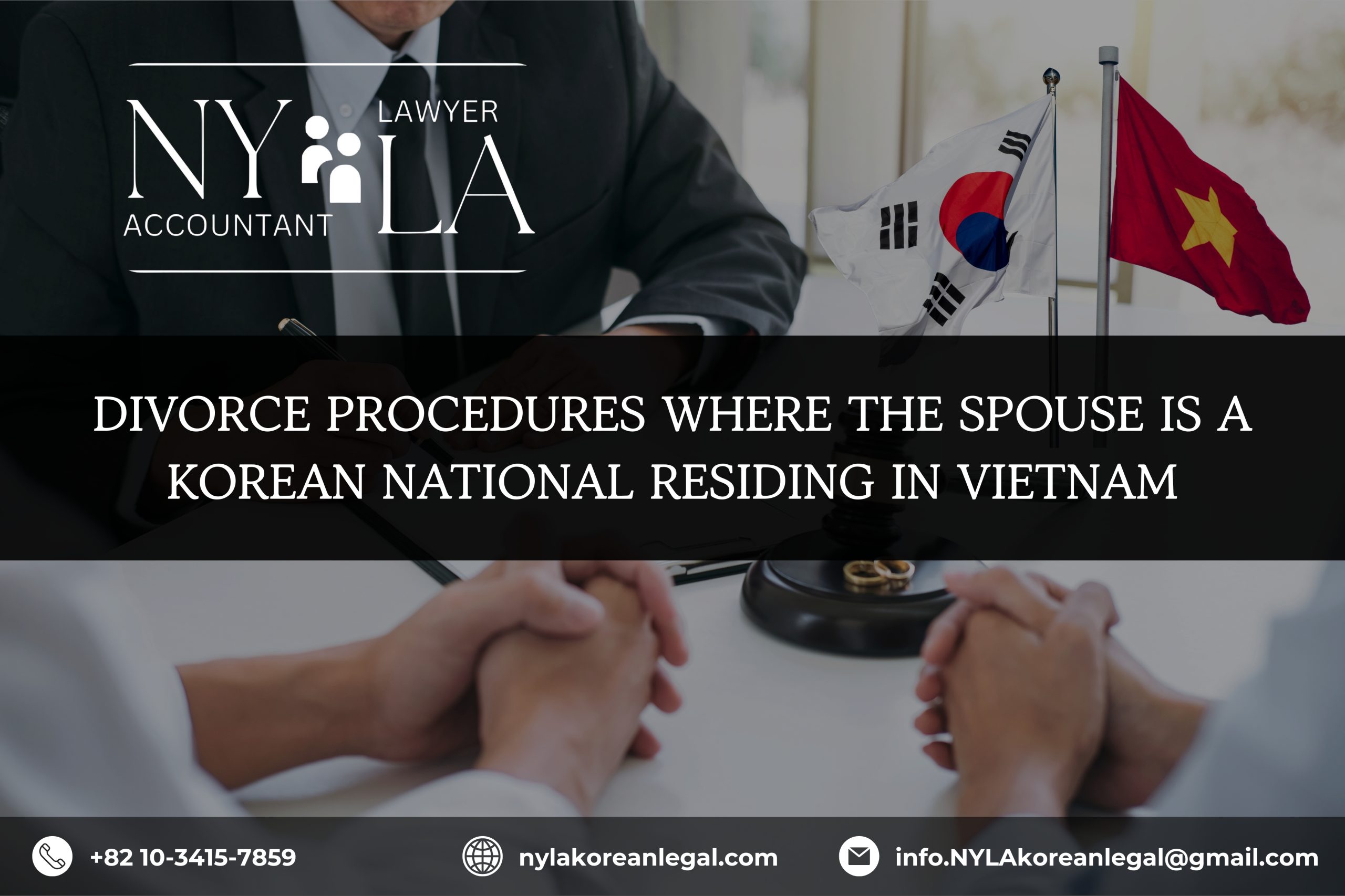Summary
1. Who is entitled to file for divorce in Vietnam?
When a spouse is a Korean national legally residing in Vietnam, they have the right to file for divorce at a Vietnamese Court. The other spouse may be Vietnamese or another foreign national. Divorce proceedings are conducted based on Vietnamese law and relevant international regulations.
2. Jurisdiction for divorce proceedings
Currently, Vietnamese law has changed regarding the jurisdiction over cases with foreign elements. Previously, provincial Courts had jurisdiction; however, from July 1, 2025, the regional-level People’s Courts will handle divorce cases involving foreign elements.
- The regional Court where the respondent (the party being sued for divorce) resides or works shall have jurisdiction to receive and adjudicate the case.
- If the respondent does not reside in Vietnam, the Court where the petitioner resides or works may accept the case.
3. Forms of divorce
There are two common forms of divorce:
3.1. Consensual divorce
- Both spouses voluntarily agree to divorce and settle all matters, such as child custody and property division.
- The procedure is expedited and does not require a Court hearing.
3.2. Unilateral divorce
- One party files for divorce even though the other does not agree or the parties cannot reach an agreement on related matters.
- The Court will hold a hearing to examine the case and issue a judgment.

4. Documents required for filing a divorce petition
- Divorce petition: The form prescribed by Vietnamese Courts.
- Marriage certificate:
-
- If the marriage was registered in Vietnam, the original certificate should be used.
- If the marriage was registered in Korea, the document must be translated into Vietnamese and consular legalized (with the seal of the Vietnamese Embassy/Consulate in Korea or vice versa).
- Identity documents:
-
- Vietnamese nationals: Valid ID card/citizen identification card or passport.
- Korean nationals: Valid passport and documents proving legal residence in Vietnam (temporary residence card or permanent residence card).
- Birth certificate of the children, if any.
- Documents related to joint property, such as land use rights certificates, vehicle ownership certificates, and bank documents, if the division of property is requested during the divorce.
- Documents proving the respondent’s place of residence, to establish the Court’s jurisdiction (e.g., temporary residence confirmation, etc.).
5. Divorce procedure
Step 1: Filing the divorce petition
- The petitioner must prepare all required documents and submit them to the regional People’s Court where the respondent resides or works.
- In the case of a consensual divorce, the documents may be submitted at the Court where either party resides.
Step 2: Court acceptance of the divorce petition
- The Court will examine the submitted documents and, if they are in order, will issue a notice of acceptance.
- The petitioner must pay an advance on the Court fees, the amount of which is determined by law depending on the case (ranging from several hundred thousand to several million VND, depending on the value of the disputed property).
Step 3: Court-facilitated Reconciliation
- The Court will invite both parties for reconciliation to find a mutually acceptable solution.
- If the parties agree to divorce and reach an agreement on related matters → the Court will issue a decision recognizing the consensual divorce.
- If conciliation fails → the case will proceed to a Court hearing.
Step 4: Divorce trial (for unilateral divorce)
- The Court will hold a hearing to examine issues such as divorce, child custody, and property division.
- Both parties may present their arguments and submit evidence.
- The Court will issue a judgment upon the conclusion of the hearing.
Step 5: Enforcement of the Court decision
- The judgment or decision is legally effective.
- Both parties shall carry out the division of property and transfer of child custody in accordance with the Court’s decision.
- If necessary, the Korean party may complete the procedure to register the divorce at the Embassy or Consulate of Korea in Vietnam.
6. Some Important Notes
- Foreign documents must be translated and consular legalized: Documents issued by Korea must be translated into Vietnamese and consular legalized in order to be accepted by Vietnamese courts.
- Child custody is not dependent on nationality: The Court prioritizes the best interests of the child and may grant custody to either the father or the mother.
- Property division: The Court only adjudicates property located in Vietnam. Property in Korea must be handled in accordance with Korean law or through other international procedures.
- Processing time: Typically 3–6 months, but may be longer in cases of complex disputes.
- Court language: If a party does not understand Vietnamese, the Court will provide an interpreter.
7. Conclusion
- Divorce involving a Korean national in Vietnam must comply with Vietnamese law.
- Preparing valid documents, translations, and consular legalization is a very important step.
- Understanding the Court’s jurisdiction and the procedural steps helps expedite the process and avoid delays.
- In cases involving property or children, it is necessary to prepare evidence and specific agreements for Court approval.558778
8. About NYLA – Korean Legal Office

■ NYLA – Your Trusted Legal Partner in Korea
At NYLA, we understand that the success of foreign businesses in Korea requires not only a solid business strategy but also reliable legal support. With a team of experienced Korean attorneys and legal professionals, NYLA provides tailored legal services for companies, investors, and individuals operating or planning to establish a presence in Korea.
We support our clients throughout the entire business journey with comprehensive services, including:
- Legal consultation on company establishment, taxation, and immigration;
- Advice on commercial real estate, franchising, and product distribution;
- Support in human resources, marketing, and business strategy.
In addition to legal advisory, NYLA also represents clients in civil litigation cases related to business, labor, marriage, family, and inheritance to ensure their rights and interests are fully protected.
■ Contact NYLA

If you’re a foreign business or individual looking for a reliable legal partner in Korea, NYLA is here to help. We are committed to delivering effective, practical, and personalized legal solutions for every client.
With a proven track record of assisting hundreds of international clients, our team is equipped to help you navigate complex legal challenges—whether it’s commercial disputes, contract issues, or foreign investment guidance.
Don’t let legal matters hold you back. Let NYLA be your trusted guide in the Korean market.
■ Get in touch with NYLA for expert legal support
| Website: https://nylakoreanlegal.com/
FB: https://www.facebook.com/nyla.koreanlegal Tiktok: https://www.tiktok.com/@nylakoreanlegal Youtube: https://www.youtube.com/@NYLA-xd8qx Email: info.NYLAkoreanlegal@gmail.com SĐT: +82 10-3415-7859 |
 |
